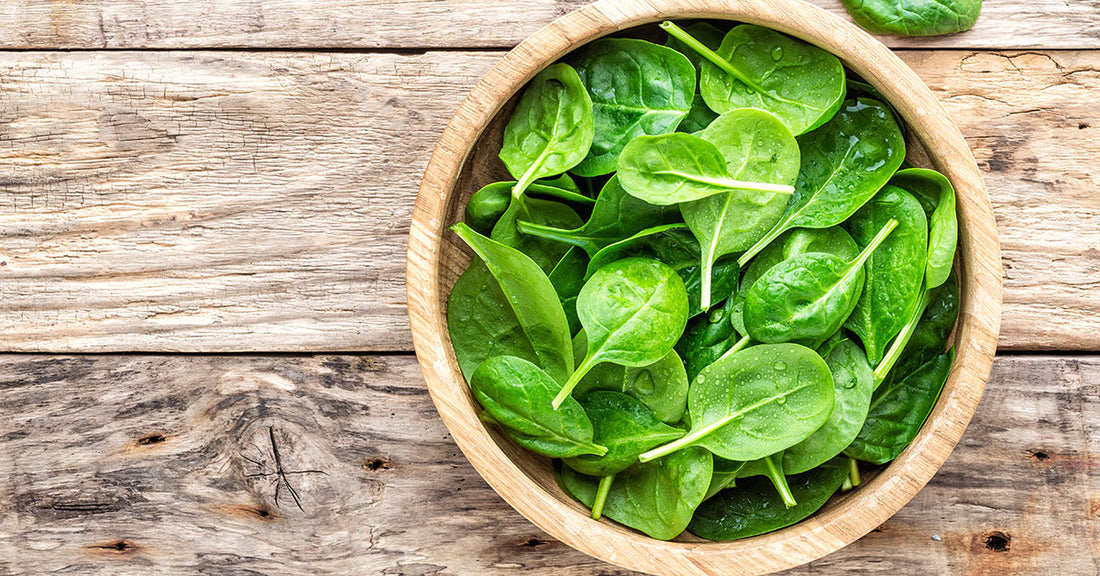Green veggies are synonymous with a healthy diet. The good news: they can back it up! Dark, leafy greens are some of the most nutritious, beneficial foods you can eat. It’s hard to find a standout in this superfood group, but spinach continues to lead the pack.
Why we love spinach
Spinach isn’t just incredibly healthy, it's delicious. It contains small amounts of glucose and fructose, sugars that give it a mildly sweet flavor. Insoluble fiber gives it bulk and body.
Thanks to its +90% water content, just cooking it for a few minutes concentrates the flavor while locking in that nutritional goodness.
Raw or cooked, fresh or canned – there’s always a way to enjoy it. If all you want are the health benefits, though, well, it's just as powerful in supplement form. But what makes spinach so good for us?
Nutritional content of spinach
Other than water, spinach is mainly comprised of fiber, vitamins, and other plant compounds. You can essentially remove 90% of its weight and keep most of its nutritional content, and that’s really where the benefits come from.
As a bulking agent, insoluble fiber is highly beneficial for digestion and gut health. Spinach is low in macronutrients like carbs and fats but rich in micronutrients like Vitamin A, iron, and folic acid.
Spinach is also an excellent source of essential compounds like lutein and nitrates. Here’s how these nutrients work together to fuel a healthy body.
Health benefits of spinach
When it comes to popular culture, it's hard to separate spinach from a certain iconic sailor. At only 2.9g per 100g serving, spinach may not have enough protein to give you Popeye-like muscles, but a strong body relies on many functions.
Spinach provides us the fuel we need to build bone, fight sickness, and even slow down age-related conditions.
-
Managing diabetes
Spinach is a great source of alpha–lipoic acid (ALA), an antioxidant that’s shown potential as a metabolic agent. Studies have noted its positive effects for diabetic patients, in particular.
Alpha-lipoic acid increases sugar uptake in both insulin-sensitive and insulin-resistant tissues. By stimulating glucose uptake, ALA lowers blood sugar levels. This helps reduce the risk of polyneuropathy – a form of nerve damage complicated by diabetes.
-
Managing blood pressure
Blood pressure is just as key to overall health, and heart health in particular. The nitrates in spinach lower blood pressure to moderate levels, lowering the risk of heart disease.
Our bodies are constantly seeking balance, using delicate systems that are incredibly sensitive to change. High blood pressure, or hypertension, can have serious health implications. Stabilizing agents like nitrates help maintain homeostasis in our cardiovascular system.
-
Rich in antioxidants
Our bodies don’t just deal with internal strain, either. Our environment is full of stressors that negatively impact our health, from air pollution to harsh chemicals. Even the parts of the environment we rely on, like the sun, can cause damage.
In fact, all these factors produce the same effect: oxidative stress. This happens when there’s an imbalance of free radicals and antioxidants in the body. The former causes oxidative stress, which breaks down cell tissue, leading to inflammation. The latter neutralizes them.
Spinach isn’t just rich in antioxidants, it’s packed with a variety of them, including Vitamin C, kaempferol, quercetin, and lutein.
- Eye health
Lutein is essential for eye health. It's abundant in our eyes, and we use it to protect them from sun damage. Along with zeaxanthin, which spinach also provides, lutein slows down macular degeneration, and can even reverse existing damage.
-
Bone health
Adult bodies need roughly 700mg of daily calcium for strong, healthy bones. Bones store the majority of the body’s calcium, which we can only absorb through food or supplements. While spinach does contain a fair amount of calcium, this isn’t what makes it beneficial.
Raw spinach can even have the opposite effect because it also contains oxalates, which block calcium absorption. Luckily, oxalic acid breaks down at high temperatures, like when you blanch, cook, or dehydrate spinach.
When it comes to bone health, the true power of spinach comes from its high vitamin K content. Vitamin K activates bone-making proteins while increasing certain markers to improve structural formation. This makes bones denser while reducing the risk of bone fractures.
Because it promotes calcium absorption, vitamin K also counteracts the blocking effects of oxalates.
-
Skin health
There’s a reason dermatologists and beauty experts love Vitamin C. As an antioxidant, it reduces the impact of oxidative stress and boosts collagen production. While collagen is important for our bones, it's also the protein that gives skin structure and elasticity.
Spinach offers a double benefit because its also rich in Vitamin A, which regulates oil production and moisture retention. When paired together, these powerful compounds support youthful, glowing skin and healthy cell functions.
-
Good hair
Cells need Vitamin A to grow, including the fastest growing tissue in the body – hair. Beyond growth, Vitamin A supports sebum production, which moisturizes the scalp and hair, protecting both from dryness.
Iron deficiency is a known cause of hair loss because it limits the oxygen blood cells carry to our cells. That makes spinach a source of not one, but two essential compounds for healthy locks.
The evergreen benefits of spinach
No list of superfoods is complete without spinach. Its high fiber content and nutrient density make it a worthwhile addition to any diet. The health benefits it offers cover a wide range of key functions we need to stay healthy, and many of them support each other.
In many ways, it represents our holistic approach to better health.
Spinach is more than just a core ingredient of Nature’s Sustenance. It works with a network of 20+ fruits and vegetables, curated to deliver effective, plant-based nutrition. That includes other leafy greens like kale and broccoli extract, and a host of berry, root, and mushroom groups that all complement each other.
The result: a vegan-friendly supplement for energy, mental clarity, and overall wellness.

